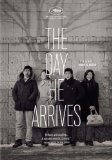| Reviews & Columns |
|
Reviews DVD TV on DVD Blu-ray 4K UHD International DVDs In Theaters Reviews by Studio Video Games Features Collector Series DVDs Easter Egg Database Interviews DVD Talk Radio Feature Articles Columns Anime Talk DVD Savant Horror DVDs The M.O.D. Squad Art House HD Talk Silent DVD
|
DVD Talk Forum |
|
|
| Resources |
|
DVD Price Search Customer Service #'s RCE Info Links |
|
Columns
|
|
|
Day He Arrives, The
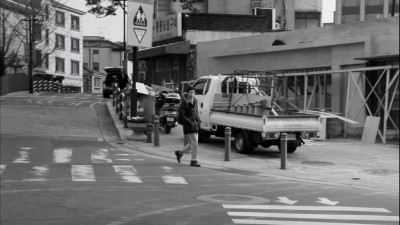
From the minute the opening credits of Hong Sangsoo's The Day He Arrives start up (bright red with white Korean characters flashing on and off to the half-sprightly, half-lilting tempo of composer Yong-jin Jeong piano piece, which constitutes the film's sparsely-used "score"), you get the feeling that you're in the hands of a master, and what follows vindicates that impression absolutely. Score and credit design might seem like small, inconsequential details, but right from the outset, Hong matches the "little things" right up with his vision, enfolding them into a film whose every aspect contributes to its simultaneous relaxed open-heartedness and powerful visual elegance. That brief snatch of melody, with its perky notes up top and a deeper, sadder undertow carrying them along, is like a succinct bit of emotional foreshadowing, a musical microcosm of the film itself. Like that salient bit of music, the film is deceptively simple yet surprisingly deep, seemingly direct yet actually quite complex, and ultimately unforgettable. Hong sustains this tone -- catchy, light notes on the surface with a melancholy undercurrent sweeping them along -- over the entire film as he recounts the story of a very brief but resonant interlude in the life of its down-on-his-luck protagonist, an artist whose impressions and experience of his own life and place in the world seem to be both heightened and compromised by his restlessly creative imagination, its convictions and deceptions, and his frustrated wish to impose a narrative on his own slapdash, humdrum reality, controlling and dramatizing the "movie" of his life, investing it with a decipherable meaning and arc that real life seldom provides.
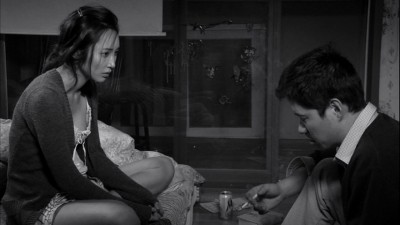
If Hong hadn't already proved himself an astute, inquisitive, slyly unpredictable explorer of ordinary yet profound matters in human life (as in his wonderful Night and Day) even when the characters don't obviously resemble him, one might suspect that the supremely sensitive, insightful, playful powers of observation he brings to bear on Sungjoon (frequent Hong star Jun-Sang Yu), the film director protagonist of The Day He Arrives, are attributable to his own familiarity with (or all-too-familiar fear of) the director's conundrum. Sungjoon, after having apparently burnt out following a mercurial rise to acclaim and fame with four well-received films, has semi-retired to obscurity as a film professor in the provinces; today, he arrives back in Seoul, where he hopes to reconnect with a film-critic friend, Youngho (Sang Jung Kim), and maybe drop in for a visit with an ex-girlfriend ( Bo-kyung kim) who's been carrying a torch for him despite their having parted on painful terms. This is unquestionably a tail-between-the-legs story, with a man who's failed to achieve his early promise facing down a past that looms in his city of origin, looking, perhaps, for some redemption or diagnosis of what went wrong. What he finds, though, is something more like rueful acceptance, and the way he (and we) finally "arrive" at that melancholy yet peaceful place is a function of Hong's exquisite narrative and stylistic ingenuity.
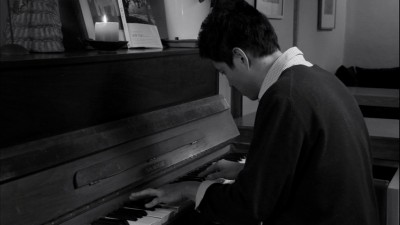
As the events of Sungjoon's brief return to Seoul unfold -- he contacts Youngho by cell phone; goes out for drinks with a group of film students he then drunkenly tells off for their burdensome worship of him; comes across an old actress acquaintance who seems desperate for a job; drops in on his ex and experiences some sad, together-for-the-last-time closure with her; and finally meets up with Youngho and Youngho's colleague/crush, Boram (Seon-mi Song) -- something strange happens, without announcing itself in any way: Some of Sungjoon's experiences -- in particular the ones following the double trauma of the film students and the ex-girlfriend, with Youngho and Boram, a down-and-out, rancorous former actor in Sungjoon's films, and the waitress/proprietress (who bears an uncanny resemblance to Sungjoon's ex and captures his attention immediately) of the bar they end up at, in addition to the chance encounter on the street with the actress acquaintance -- begin to repeat themselves, near-identically enough so we know it's the same events and interactions being re-played, but with some marked differences each time in the characters' behaviors and where the scenes end up. Sungjoon's intermittent, initially arbitrary-seeming voice-overs -- internal monologues half-addressed to us as narration of his story ("We went to a bar called 'Novel'," for example, is a voiced-over line repeated several times to clue us in that it's a repetition we're watching) -- take on new levels of potential aptness and meaning; it seems plausible that Sungjoon, with his filmmaker's predilection for inventing and composing stories, is telling us one right now. Is what we're seeing a succession of variations -- what really happened, the worst-case scenario, the idealized version -- on what actually went down between Sungjoon, Youngho, Boram, and the waitress? Is all of it just Sungjoon using the awkward occasion of a fairly inglorious return to Seoul do what he does best, exercising his disused gift now that he's out of the filmmaking loop by making imaginary gold out of the straw of dreary, unshaped everyday reality?
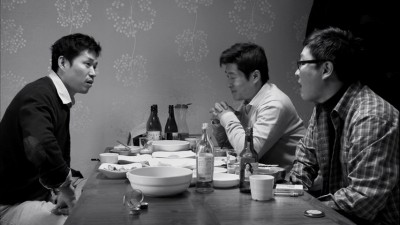
When the film makes its final foray into the ostensible recounting of Sungjoon's return to Seoul, in a sequence between the director and the waitress who so disconcertingly resembles his ex-girlfriend (they are played by the same actress, we soon realize), it's played out like the movie romance Sungjoon seems to wish for at the same time he knows full well its impossibility, yet the half-sad, fond-farewell note on which it ends it is strikingly similar to the one we saw Sungjoon and his ex wind down on earlier in the film; perhaps there are only so many fantasies and variations on reality available, after all, and maybe imagination and the transfiguration of real life through art are limited propositions. Concluding on a more "realistic" scene, with a fan on the street asking him to pose, half-flattered and half-reluctant, for a photo, we leave Sungjoon in more or less the same physical place and the same state of mind in which we found him; following the film's permutations, however, it works as a genuinely powerful, contemplative ending to the story for both Sungjoon and us -- one that takes it beyond "happy" or "sad" and into a peaceful, aware, and accepting place, not dissimilar to where Ozu's films take us, where just feeling, being, and a calm, quiet attempt to understand life's connections and disconnections are more than sufficient.
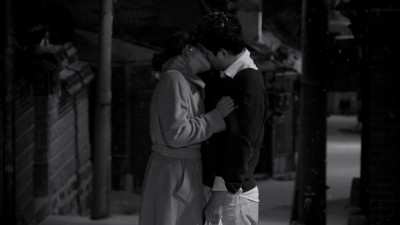
The questions -- impossible to answer definitively -- posed by the film about what we've actually seen and what it means tantalize and fire us up on the cerebral and aesthetic levels even as the drama in each variation/reiteration of the scenes we've already seen captures our attention anew, with wonderful playing all around by the very fine actors and our interest enhanced by Hong's simple, lovely framings. Using his frequent DP Hyung-ku Kim (The Host) to shoot on color digital video altered to black and white, and composing places and the people in them to achieve a particular kind of heightened everyday loveliness, Hong offers up a fully sensual layer to complement the narrative one, with its subtly mind-blowing provocations and puzzles. Snow falling softly on Seoul, the way Hong shows it to us, is something you could look at and get lost in for days. And the film's occasional but bracing zooms are filmmaking manna, brilliantly effective and revealing (it's as if, even while seriously questioning how well we can "know" these characters and their lives, he's leaning in closer to them with the camera, genuinely interested in them as human beings and wanting us to get to know them as well as we can, regardless of the self-consciously acknowledged fact that they're all made up). The camera is mostly rather still, with no flashy moves, but these zooms (analogous to the fantastic, patiently slow, small-but-significant lateral pans in Night and Day), on cinematic-grammar terms, are perfect visual punctuation, serving as a gratifying and pleasurable reminder that inventively-deployed subtleties in the craft can alter the tone of a film tremendously, even when it comes to the same techniques: If the sort of zoom shots familiar from, say, Kubrick's films work like exclamation points, with their startling, staccato re-framings, these slower, more tentative, looser-feeling zooms function as intriguing visual ellipses, heightening our curiosity about these people and what they're experiencing (even if that curiosity is distanced, refracted through Sungjoon's own outsider's fascination with and projections upon the other characters).
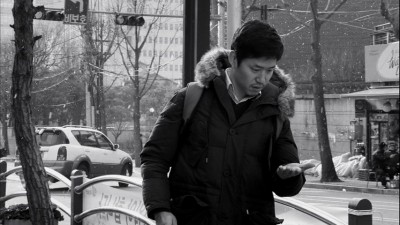
With its gorgeous black-and-white images and the spare, surpassingly elegant visual clarity and precision with which Hong composes what we're looking at, along with the rug of three-act, A-B-C plot being slowly but surely pulled out from under us, there's more than a hint of destabilizing, Last Year at Marienbad style self-reflexiveness and self-doubt to The Day He Arrives's modus operandi. But the result is quite different -- equally graceful but much less imperious, much "warmer" for lack of a better term (and not to criticize Marienbad's refreshing, abstract coolness). Hong's superb film looks and behaves like aesthetically, intellectually refined, longing-for-absent-meaning modernism, but for this filmmaker, that still leaves ample room for affection, humor, and the possibility of joy (in whatever eccentric form and however diminished expectations for it might have become). Hong's cinema, with its piercing questions and observations about meaning (and the possible lack thereof) sings, soars, engages, and moves as deeply, if not more so, than the most forthrightly emotion-saturated melodrama; refusing to choose between the heart and the mind, his is the most humane kind of modernism imaginable.
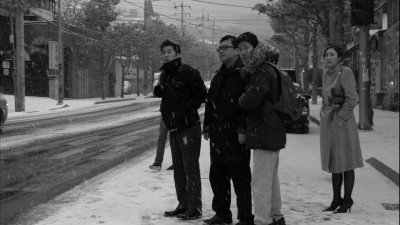
THE DVD:
The black-and-white HD digital cinematography comes through quite well in this very good transfer, which presents the film at an anamorphic-widescreen aspect ratio of 1.77:1 (not the 1.85:1 indicated on the outer sleeve, though the 1.77:1 does appear to be the correct AR). The contrasts are clear and nicely variegated, blacks are solid, skin tones natural, and there is a minimum of aliasing; the main problem is some (usually) very moderate edge enhancement throughout, which doesn't constitute an insurmountable distraction.
Sound:The disc's Dolby Digital 2.0 soundtrack conveys the film's sound very well, with the small but memorable amounts of music, traffic/background noise, and dialogue all rendered with perfect clarity and depth, with no imbalance or distortion.
Extras:--An hour-long interview/Q&A with director Hong Sangsoo, conducted/mediated by critic Tony Rayns, videotaped after a British Film Institute screening of a film in their September 2010 Hong retrospective. (This session occurred before the time of The Day He Arrives, and so focuses on Hong's prior work.) The interview is rather awkward; Hong is charming and intelligent but painfully shy, so the avuncular, knowledgeable Rayns has to save the day, doing his best to draw out the filmmaker and soften the blow of some embarrassing audience questions. Still, it's an interesting conversation overall, and (mostly courtesy of Rayns) serves as a good primer on Hong's body of work as a whole.
--More enlightening when it comes to the film at hand, an 11-minute video essay by critic Kevin Lee does a good, close, structurally very specific analysis/reading of the film, and is both a great aid in understanding The Day He Arrives and an excellent example of how to approach, think about, and understand (if not "interpret") a film, particularly one as rich as this.
--The film's witty, original theatrical trailer, along with a large handful of trailers for other good-to-great Cinema Guild titles.
--An insert with an essay on the film by critic/curator James Quandt that, as usual for Quandt (who has written monographs on Bresson and Achipatpong, among others), offers an insightful, sensitive, and learned reading and appreciation of the film and its maker.
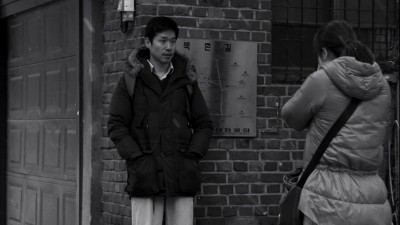
Korean director Hong Sangsoo, one of the most exciting filmmakers working today, enters another winning, simultaneously cerebral and tender, subtly formidable achievement into his fast-approaching-classic filmography with The Day He Arrives. The film at first seems deceptively like an autobiographical, portrait-of -the-artist type of story, dealing as it does with the return of an acclaimed but burnt-out filmmaker to his hometown, with its bittersweet bygone acquaintances and sights. Hong performs a magic trick you can't predict, however: With no fanfare, just near-imperceptible branching off from a nicely ambling pace with interactions shot and played as if the story were simply a gentle slice of life, the same scenes and characters reappear and replay themselves in slightly (and then not-so-slightly, but still recognizable) altered form, and everything straightforwardly low-key takes on a sweetly disorienting, repetition-powered mystery, the film transforming itself into a sublime contemplation of another, richer kind of bittersweetness -- the kind that marks an artist's troubled, imagination-burdened relation to real life as well as the seemingly infinite possibilities of fantasy when they strain against the limits of reality. It's a bold, smart, rueful, kind, sometimes funny film that's at once incredibly audacious, effortlessly well-realized, and possessed of an even-tempered modesty that makes it all the more absorbing and impressive -- a must-see and must-see-again that also makes a perfect introduction to Hong's sublime cinema for the uninitiated, or, for the already-converted, a confirmation of his genius and more fuel for anticipation of what's sure to be his next masterful stroke. Highly Recommended.
|
| Popular Reviews |
| Sponsored Links |
|
|
| Sponsored Links |
|
|
| Release List | Reviews | Shop | Newsletter | Forum | DVD Giveaways | Blu-Ray | Advertise |
|
Copyright 2024 DVDTalk.com All Rights Reserved. Legal Info, Privacy Policy, Terms of Use,
Manage Preferences,
Your Privacy Choices | |||||||









